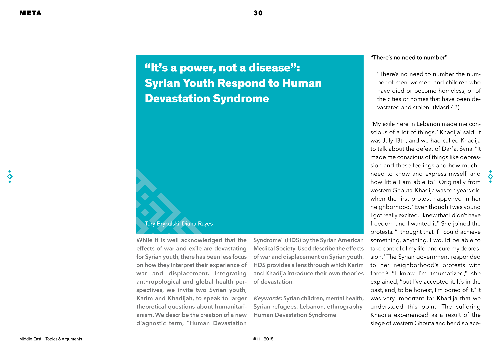"It's a power, not a disease": Syrian Youth Respond to Human Devastation Syndrome
While it is well acknowledged that the effects of war and exile are devastating for Syrian youth, there has been less focus on how they interpret their experience of war and displacement. Integrating anthropological and global health perspectives, we invite two Syrian youth, Karim and Khadijah, to s...
I tiakina i:
| I whakaputaina i: | Middle East - Topics & Arguments |
|---|---|
| Ngā kaituhi matua: | , |
| Hōputu: | Artikel (Zeitschrift) |
| Reo: | Ingarihi |
| I whakaputaina: |
Philipps-Universität Marburg
2018
|
| Ngā marau: | |
| Urunga tuihono: | Urunga tuihono |
| Tags: |
Tāpirihia he Tūtohu
Keine Tags, Fügen Sie den ersten Tag hinzu!
|
| Whakarāpopototanga: | While it is well acknowledged that the effects of war and exile are devastating for Syrian youth, there has been less focus on how they interpret their experience of war and displacement. Integrating anthropological and global health perspectives, we invite two Syrian youth, Karim and Khadijah, to speak to larger theoretical questions about humanitarianism. We describe the creation of a new diagnostic term, “Human Devastation Syndrome” (HDS) by the Syrian American Medical Society. Used describe the effects of war and displacement on Syrian youth, HDS provides a lens through which Karim and Khadija introduce their own theories of devastation. |
|---|---|
| DOI: | 10.17192/meta.2018.11.7803 |
 Publikationsserver
Publikationsserver